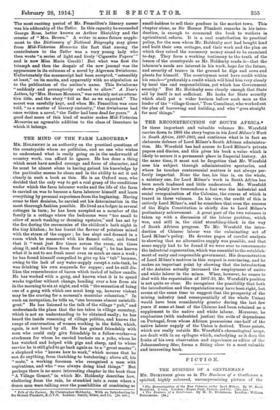THE RECONSTRUCTION OF SOUTH AFRICA.* Ix these important and valuable
volumes Mr. Worsfold carries down to 1905- the story begun in his Lord Milner's Work in South Africa, 1897-1902, and continues what is in fact an elaborate defence of Lord Milner's South African adminiatra- tion. Mr. Worsfold has had access to Lord Milner's private papers and diaries, and this gives his hook a value which is likely to secure it a permanent place in Imperial history. At the same time, it must not be forgotten that Mr. Worsfold sees his subject through administrative spectacles, and where he touches controversial matters is not always per- fectly impartial. None the less, his bias is, on the whole, a salutary one, for Lord Milner's work in South Africa has been much traduced and little understood. Mr. Worsfold shows plainly how tremendous a feat was the industrial and social reorganization of the Colonies, the course of which is traced in these volumes. In his view, the credit of this is entirely Lord Milner's, and he considers that even the success of the Elgin Constitution is chiefly due to Lord Milner's preliminary achievement. A great part of the two volumes is taken up with a discussion of the labour problem, which was, and still is, the chief stumbling-block in the way of South African progress. To Mr. Worsfold the intro. auction of Chinese labour was the culminating act of Lord Milner's policy. He devotes pages of careful analysis to showing that no alternative supply was possible, and that some supply had to be found if we were ever to consummate the industrial regeneration, which was essential to the establish- ment of unity and responsible government. His demonstration of Lord Milner's motives in this respect is convincing, and he makes an important point by .showing that the introduction of the Asiatics actually increased the employment of native and white labour in the mines. When, however, be comes to deal with the repatriation of 1907.10, Mr. Worsfold'e position is not quite so clear. He recognizes the possibility that both the introduction and the repatriation may have been right, but seems at the same time to suggest that the prosperity of the mining industry (and consequentially of the whole Union) would have been considerably greater during the last few years if some at least of the Chinese had been retained as a supplement to the native and white labour. Moreover, be emphasizes (with undoubted justice) the evils of dependenee on Portugal, from whose African possessions one-balf of the native labour supply of the Union is derived. These points, which are really outside Mr. Worefold's chronological scope, are dealt with in an epilogue which, embodying as it does the fruits of his own observation and experience as editor of the Johannesburg Star, forms a fitting close to a most valuable and interesting book.














































 Previous page
Previous page